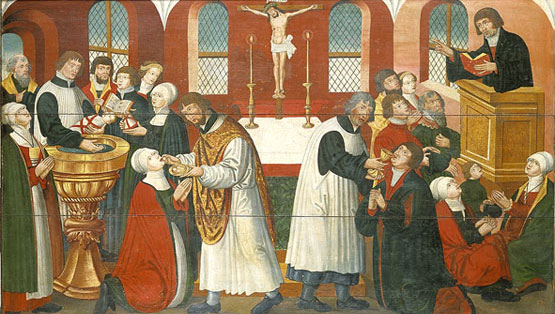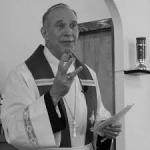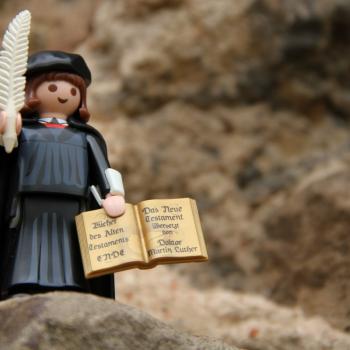
So far we have dealt with the mass and the function of the minister or bishop. Now we shall speak of the proper manner of communicating the people, for whom the Lord’s Supper was primarily instituted and given this name. For just as it is absurd for a minister to make a fool of himself and publicly preach the Word where no one hears or to harangue himself in an empty room1 or under the open sky, so it is equally nonsensical if the ministers prepare and embellish the Lord’s Supper, which belongs to all, without having guests to eat and drink it, so that they who ought to minister to others, eat and drink by themselves alone at an empty table and in a vacant room. Therefore, if we really want to cherish Christ’s command, no private mass should be allowed in the church, except as a temporary concession for the sake of necessity or for the weak in faith.
Here one should follow the same usage as with baptism, namely, that the bishop be informed of those who want to commune. They should request in person to receive the Lord’s Supper so that he may be able to know both their names and manner of life. And let him not admit the applicants unless they can give a reason for their faith and can answer questions about what the Lord’s Supper is, what its benefits are, and what they expect to derive from it. In other words, they should be able to repeat the Words of Institution from memory and to explain that they are coming because they are troubled by the consciousness of their sin, the fear of death, or some other evil, such as temptation of the flesh, the world, or the devil, and now hunger and thirst to receive the word and sign of grace and salvation from the Lord himself through the ministry of the bishop, so that they may be consoled and comforted; this was Christ’s purpose, when he in priceless love gave and instituted this Supper, and said, “Take and eat,” etc.
But I think it enough for the applicants for communion to be examined or explored once a year. Indeed, a man may be so understanding that he needs to be questioned only once in his lifetime or not at all. For, by this practice, we want to guard lest the worthy and unworthy alike rush to the Lord’s Supper, as we have hitherto seen done in the Roman church. There they seek only to communicate; but the faith, the comfort, the use and benefit of the Supper are not even mentioned or considered. Nay, they have taken pains to hide the Words of Institution, which are the bread of life itself, and have furiously tried to make the communicants perform a work, supposedly good in itself, instead of letting their faith be nourished and strengthened by the goodness of Christ. Those, therefore, who are not able to answer in the manner described above should be completely excluded and banished from the communion of the Supper, since they are without the wedding garment [Matt. 22:11–12].
When the bishop has convinced himself that they understand all these things, he should also observe whether they prove their faith and understanding in their life and conduct. For Satan, too, understands and can talk about all these things. Thus if the pastor should see a fornicator, adulterer, drunkard, gambler, usurer, slanderer, or anyone else disgraced by a manifest vice, he should absolutely exclude such person from the Supper—unless he can give good evidence that his life has been changed. For the Supper need not be denied to those who sometimes fall and rise again, but grieve over their lapse. Indeed, we must realize that it was instituted just for such people so that they may be refreshed and strengthened. “For in many things we offend all” [Jas. 3:2]. And we “bear one another’s burdens” [Gal. 6:2], since we are burdening one another. But I was speaking of those arrogant people who sin brazenly and without fear while they boast glorious things about the gospel.
When mass is being celebrated, those to receive communion should gather together by themselves in one place and in one group. The altar and the chancel were invented for this purpose. God does not care where we stand and it adds nothing to our faith. The communicants, however, ought to be seen and known openly, both by those who do and by those who do not commune, in order that their lives may be better observed, proved, and tested. For participation in the Supper is part of the confession by which they confess before God, angels, and men that they are Christians. Care must therefore be taken lest any, as it were, take the Supper on the sly and disappear in the crowd so that one cannot tell whether they live good or evil lives. On the other hand, even in this matter I do not want to make a law, but simply want to demonstrate a decent and fitting order to be used in freedom by free Christian men.
Now concerning private confession before communion, I still think as I have held heretofore, namely, that it neither is necessary nor should be demanded. Nevertheless, it is useful and should not be despised; for the Lord did not even require the Supper itself as necessary or establish it by law, but left it free to everyone when he said, “As often as you do this,” etc. [I Cor. 11:25–26]. So concerning the preparation for the Supper, we think that preparing oneself by fasting and prayer is a matter of liberty. Certainly one ought to come sober and with a serious and attentive mind, even though one might not fast at all and pray ever so little. But the sobriety I speak of is not that superstitious practice of the papists. I demand it lest people should come belching their drink and bloated with overeating. For the best preparation is—as I have said—a soul troubled by sins, death, and temptation and hungering and thirsting for healing and strength. Teaching these matters to the people is up to the bishop.
It remains to be considered whether both forms,2 as they call them, should be administered to the people. Here I say this: Now that the gospel has been instilled among us these two whole years, we have humored the weak in faith long enough. Hereafter we shall act according to the words of St. Paul, “If any man be ignorant, let him be ignorant” [I Cor. 14:38]. For if after all this time they have not understood the gospel, it matters little whether they receive either form. If we continue to make allowance for their weakness, we only run the risk of confirming their obstinacy and of making rules contrary to the gospel. Wherefore, both forms may be requested and shall be offered in simple compliance with the institution of Christ. Those who refuse them will be left alone and receive nothing. For we are devising this order of the mass for those to whom the gospel has been proclaimed and by whom it has been at least partly understood. Those who have not yet heard or understood it are also not ready to receive advice concerning this matter [of liturgical forms].
Nor is it necessary to wait for a council—as they prate—in order to have this practice sanctioned. We have the law of Christ on our side and are not minded to be delayed by or to listen to a council in matters which manifestly are part of the gospel. Nay, we say more: If by chance a council should establish and permit this practice, then we would be the last to partake of both forms. Nay, in contempt both of the council and of its statute, we should then wish to partake either of one or of neither, but never of both; and we would hold those to be wholly anathema who on the authority of such a council and statute would partake of both.
You wonder why and ask for a reason? Listen! If you know that the bread and wine were instituted by Christ and that both are to be received by all—as the Gospels and Paul testify so clearly that even our adversaries themselves are forced to admit it—and if you still dare not believe and trust in Him enough to receive both forms, but dare to do so after men decide this in a council, are you not preferring men to Christ? Do you not extol sinful men over Him who is named God and worshiped as such [II Thess. 2:3–4]? Do you not trust in the words of men more than in the words of God? Nay rather, do you not utterly distrust the words of God and believe only the words of men? And how great a rejection and denial of God the most high is that? What idolatry can be compared to the superstitious regard in which you hold the council of men? Should you not rather die a thousand deaths? Should you not rather receive one or no form at all, than [both] in the name of an obedience which is a sacrilege and of a faith that amounts to apostasy?
Therefore, let them stop prating of their councils. First, let them do this: Let them restore to God the glory which they have denied him. Let them confess that with Satan their master they have held back one form, that they have lifted themselves up above God, that they have condemned his word, and have led to perdition so many people for so long a time. And let them repent of this unspeakably cruel and godless tyranny. Then, let them solemnly declare that we have done right when on our part and even against their dogma we have taught and received both forms and have not waited for their council. And let them give thanks, because we have refused to follow their perditious abomination. When they have done this, we shall gladly and willingly honor and obey their council and [its] statute. In the meantime, while they fail to do so and instead continue to demand that we should await their authorization, we shall listen to nothing. Rather, we shall continue to teach and act against them, particularly where we know it displeases them most. For what do they require with their diabolical demand except that we should exalt them above God and their words above his, and that we should receive the phantoms of their fancy as idols in the place of God? It is our concern, however, that the whole world be completely subjected and obedient to God.
I also wish that we had as many songs as possible in the vernacular which the people could sing during mass, immediately after the gradual and also after the Sanctus and Agnus Dei. For who doubts that originally all the people sang these which now only the choir sings or responds to while the bishop is consecrating? The bishops may have these [congregational] hymns sung either after the Latin chants, or use the Latin on one [Sun]day and the vernacular on the next, until the time comes that the whole mass is sung in the vernacular. But poets are wanting among us, or not yet known, who could compose evangelical and spiritual songs, as Paul calls them [Col. 3:16], worthy to be used in the church of God. In the meantime, one may sing after communion, “Let God be blest, be praised, and thanked, Who to us himself hath granted,”3 omitting the line, “And the holy sacrament, At our last end, From the consecrated priest’s hand,” which was added by some devotee of St. Barbara4 who, having neglected the sacrament all his life, hoped that he would on his deathbed be able to obtain eternal life through this work rather than through faith. For both the musical meter and structure prove this line to be an interpolation.5 Another good [hymn] is “Now Let Us Pray to the Holy Ghost”6 and also “Ein Kindelein so löbelich.”7 For few are found that are written in a proper devotional style. I mention this to encourage any German poets to compose evangelical hymns for us.
This is enough for now about the mass and communion. What is left can be decided by actual practice, as long as the Word of God is diligently and faithfully preached in the church. And if any should ask that all these [forms] be proved from Scriptures and the example of the fathers, they do not disturb us; for as we have said above, liberty must prevail in these matters and Christian consciences must not be bound by laws and ordinances. That is why the Scriptures prescribe nothing in these matters, but allow freedom for the Spirit to act according to his own understanding as the respective place, time, and persons may require it. And as for the example of the fathers, [their liturgical orders] are partly unknown, partly so much at variance with each other that nothing definite can be established about them, evidently because they themselves used their liberty. And even if they would be perfectly definite and clear, yet they could not impose on us a law or the obligation to follow them.
As for the other days which are called weekdays,8 I see nothing that we cannot put up with, provided the [weekday] masses be discontinued. For Matins with its three lessons, the [minor] hours, Vespers, and Compline de tempore consist—with the exception of the propers for the Saints’ days—of nothing but divine words of Scripture. And it is seemly, nay necessary, that the boys should get accustomed to reading and hearing the Psalms and lessons from the Holy Scripture. If anything should be changed, the bishop may reduce the great length [of the services] according to his own judgment so that three Psalms may be sung for Matins and three for Vespers with one or two responsories.9 These matters are best left to the discretion of the bishop. He should choose the best of the responsories and antiphons and appoint them from Sunday to Sunday throughout the week, taking care lest the people should either be bored by too much repetition of the same or confused by too many changes in the chants and lessons. The whole Psalter, Psalm by Psalm, should remain in use, and the entire Scripture, lesson by lesson, should continue to be read to the people. But we must take care—as I have elsewhere explained—0 lest the people sing only with their lips, like sounding pipes or harps [I Cor. 14:7], and without understanding. Daily lessons must therefore be appointed, one in the morning from the New or Old Testament, another for Vespers from the other Testament with an exposition in the vernacular. That this rite is an ancient one is proven by both the custom itself and by the words homilia in Matins and capitulum11 in Vespers and in the other [canonical] hours, namely, that the Christians as often as they gathered together read something and then had it interpreted in the vernacular in the manner Paul describes in I Corinthians 14 [:26–27].12 But when evil times came and there was a lack of prophets and interpreters, all that was left after the lessons and capitula was the response, “Thanks be to God.”13 And then, in place of the interpretation, lessons, Psalms, hymns, and other things were added in boring repetition. Although the hymns and the Te Deum laudamus at least confirm the same thing as the Deo gratias, namely, that after the exposition and homilies they used to praise God and give thanks for the revealed truth of his words. That is the kind of vernacular songs I should like us to have.
This much, excellent Nicholas, I have for you in writing about the rites and ceremonies which we either already have instituted in our Wittenberg church or expect to introduce, Christ willing, at an early date. If this example pleases you and others, you may imitate it. If not, we will gladly yield to your inspiration14 and are prepared to accept corrections from you or from others. Nor should you or anyone else be deterred by the fact that here in Wittenberg the idolatrous “Topheth” [Jer. 7:31–32; 19:6] still continues as a shameless, ungodly source of revenue for the princes of Saxony. I am speaking of the Church of All Saints.15 For by the mercy of God, we have so great an antidote among us in the riches of his Word that this plague languishes in its own little corner and can only contaminate itself. There are scarcely three or four swinish gluttons left to serve mammon in that house of perdition. To all others and to the whole populace, it is a loathsome and abominable thing. But we dare not proceed against them by force or by law, for Christians—as you know—should not fight except with the power of the sword of the Spirit. This is how I restrain the people every day. Otherwise, that house of all the saints—or rather of all the devils—would long be known by another name in all the earth. I have not used the power of the Spirit which the Lord has given me [II Cor. 13:10] against it, but patiently have borne this reproach if perchance God may give them repentance. Meanwhile, I am content that our house, which is more truly the house of all saints, reigns and stands here as a tower of Lebanon against the house of the devils [Song of Sol. 7:4]. Thus we torment Satan with the Word, even though he pretends to laugh. But Christ will grant that his hope will fail him and that he will be overthrown in the sight of all. Pray for me, you saint of God. Grace be with you and with us all. Amen.
Blessed Martin Luther, “The Communion of the People” from “An Order of Mass and Communion For the Church at Wittenberg” 1523. LW 53: Liturgy and Hymns, J. J. Pelikan, H. C. Oswald, & H. T. Lehmann, eds. Philadelphia, Fortress Press, pp. 32–40.
1 Literally, inter saxa et ligna, “between stones and wood.”
2 Both elements, i.e., bread and wine.
3 See pp. 252–254.
4 St. Barbara was called upon as intercessor to assure people that they would be able to receive the sacraments of penance and the eucharist in the hour of death.
5 It was sung to the same melody which had already served the two previous lines: “Let God be blessed,” etc., and “That his own flesh and blood,” etc. The line censured by Luther is lacking in one of the two pre-Reformation sources for this hymn.
6 See pp. 263–264.
7 A pre-Reformation Christmas hymn to the melody “Dies est laetitiae.” See Julian, Dictionary of Hymnology, p. 325. For text and melody of this hymn, see Wilhelm Bäumker, Das katholische deutsche Kirchenlied (Freiburg: Herder, 1886), I, 286–289.
8 Feriae.
9 Ordinarily, Matins had nine Psalms and eight responsories, Vespers and Compline eight Psalms and one responsory.
10 See pp. 11–14.
11 Homilia, i.e., “sermon,” was the name of the lessons in Matins, which were taken both from Scripture and the writings of the church fathers. Capitulum, i.e., “chapter,” is the name for the diminutive one-verse lesson read in Vespers. On this basis, Luther argues that Scripture readings had originally been longer—“chapter” rather than “verse”—and were followed by interpretative sermons.
12 Cf. p. 11, n. 2.
13 Deo gratias.
14 Literally, “unction.”
15 This was the same church on the doors of which Luther had nailed the Ninety-five Theses six years earlier. It contained a famous collection of more than seventeen thousand relics which the Elector had amassed and which by attracting the seekers of indulgences were a lucrative revenue for the church. In 1522 they had once again been on exhibition, but on All Saints’ Day, 1523, the custom was discontinued.
+SDG+











